Dana Merritt rotated her guitar in her palms, hitting the side with the back of her hand before turning her attention to the tuning pegs. A string of white lights flashed on and off behind her.
“Who here has been depressed?” she asked. One eye stayed on the audience, the other on her guitar. A single hand went up. Then two, then three.
“This song is for all the people who didn’t raise their hands,“ she said. “It’s called ‘Don’t act like it doesn’t happen to you.’”
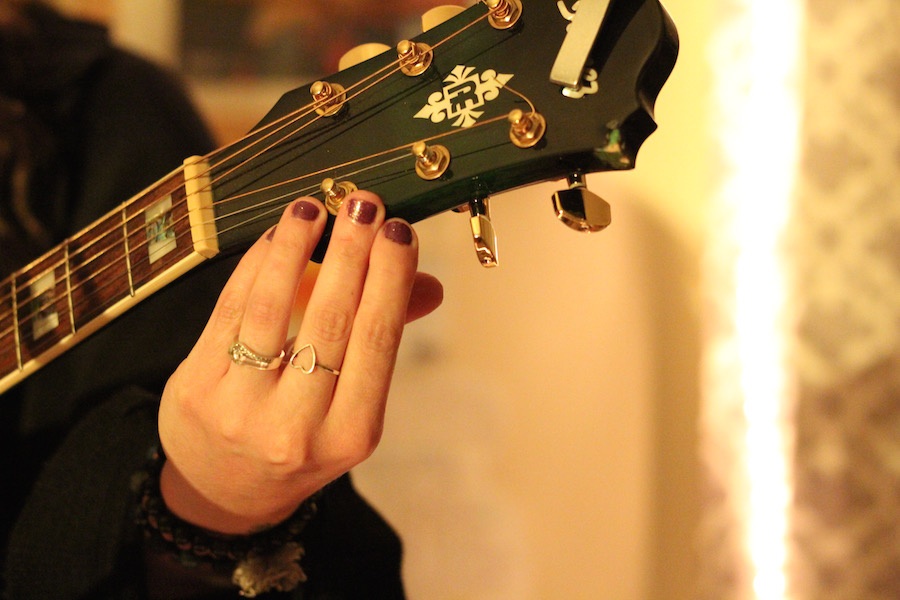
Semeghini: There was nothing here for queer folks. Lucy Gellman Photos.
Saturday night, Merritt was one of three artists to bring finger-picking, loop-pedaling, full-lunged goodness to AcoustiQueers CT, a new monthly series for LGBTQIA artists in Connecticut. Inspired by AcoustiQueers New York, the series started in Bridgeport last month, billed as a house show meets Gay-Straight Alliance (GSA) for grown ups.
Saturday’s session brought the tradition to New Haven, musician Olive Alice opening her Westville home to a crowd of 25.
Also referred to as AcoustiQ, AcoustiQueers goes back to musician Eli Wood, who started the series in New York City a year ago. Living in Bridgeport, musician Virginia Semeghini had heard about it from an artist named Anjimile, and performed at an early AcoustiQ in Brooklyn. All of the elements were “kind of perfect,” she said—a fifth-floor rooftop concert populated with queer artists, outside on a warm summer night. She said she knew then and there that she wanted to bring it to Connecticut. The beta test would be her home.
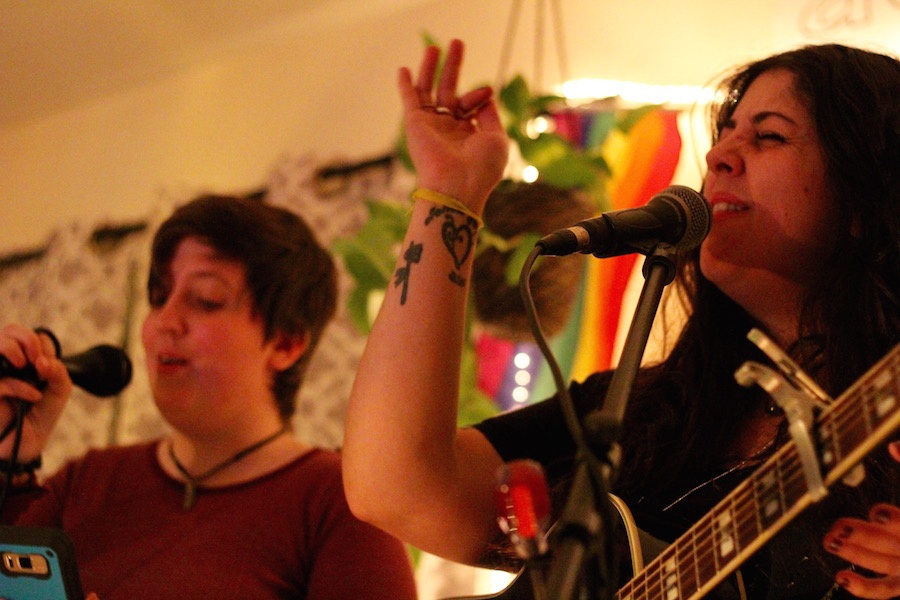
Virginia Semeghini and her partner, Maddie.
“I started thinking, like, ‘What’s in Connecticut?’,” she said Saturday. “When you’re in high school or college, you have GSA or you have a bunch of other options of things that you can do to find your community. But when you get to be an adult, you don’t really have that. There’s no GSA for adults, and most of the gay scene is clubs and partying and dancing.”
“I’ve learned a lot from the trans community,” she added. “About venues insisting or using the wrong pronouns for a performer. We’ve all been trough sexist venue owners. Being a woman is already a difficult thing in the music industry. And then you are queer on top of that. Or you’re trans. It’s one more layer.”
That hope for a small, inclusive space filled the room for nearly three hours, a triple bill that matched Brazil-born Semeghini with musician Jessica Iris and finger-picker Dana Merritt. As attendees trickled in, Semeghini and Olive Tiger greeted them with hugs, making space for their things an Narnia-esque coat closet and arranging chairs, bed cushions and meditation pillows for seats on the wood floor.
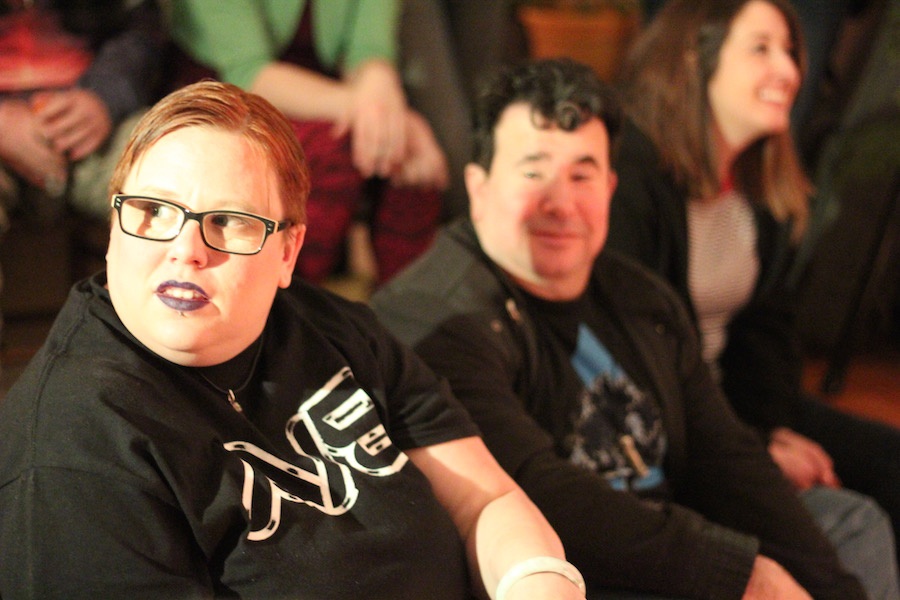
Conversation floated through the room, then quieted to a lull just after 7 p.m. Olive brought the overhead lights down, replaced with blue, pink and yellow strobes and white lights behind the performers. Her wall of inspiration—a nod to tUnE-yArDs beside a poster from her first show—became the stage.
Kicking the evening off with a mix of acoustic originals, dizzying loops and a single cover, Iris captivated that space, her face bathed in the blue and pink strobes in the back of the room. Based in Coventry (“is it Coventry or Coventry?” audience members asked, unable to come to an answer) and performing in New Haven for the first time, she launched into a winding set, jumping between folk, rockabilly, classic rock, ambient and something entirely hers. Cheers and whoops of affirmation flew through the air.
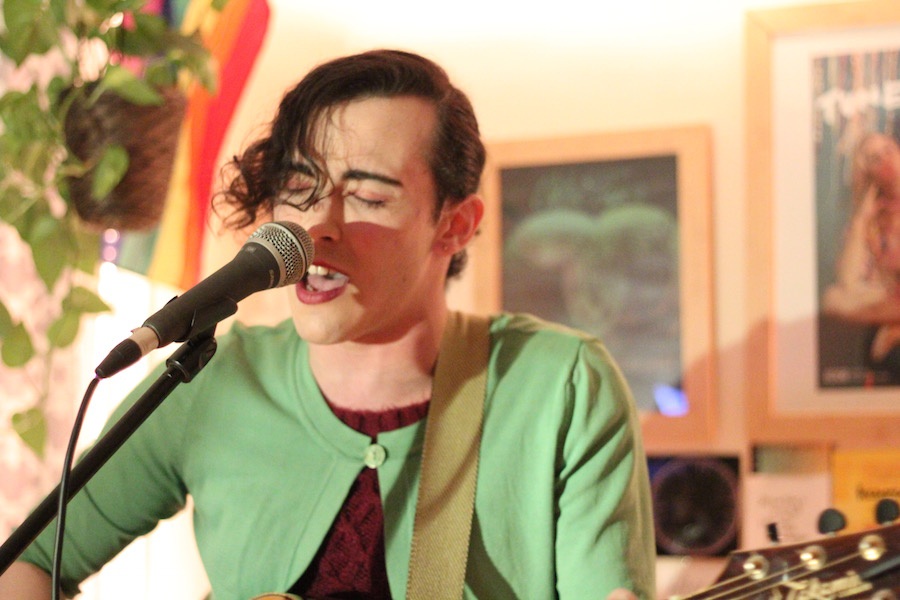
“I usually play in bars where people are watching ball games, and they clap to the game,” she said to laughs. “This is the best audience I’ve ever played for.”
Attendees leaned in, transfixed by the knife edge of her voice testing its limits, then finding itself in the loudest, longest and wildest notes. After a string of originals melted into each other, she ended on a full-lunged, energetic cover of Jason Mraz’ “Tonight, Not Again.”
“It’s the most receptive crowd I’ve ever played for, as both a musician and trans woman,” she said in a 10-minute break between sets. “The deeper you get into being a woman, the harder it gets. Here, there were so many moments of bliss. It’s incredible that it was a specially curated as a safe space for the LGBTQIA+ community.”
Stepping up to the mic, Semeghini kept that warmth going, her voice coating the apartment in a voice that was ginger tea with bourbon, red silk with velveteen trim on the sides. She transformed from an organizer into performer That Virginia, spinning a mix of folk, Americana, and Indie that conjured Florence Welch and vintage Jewel, with drops of honey and diamond dust right where they belonged.
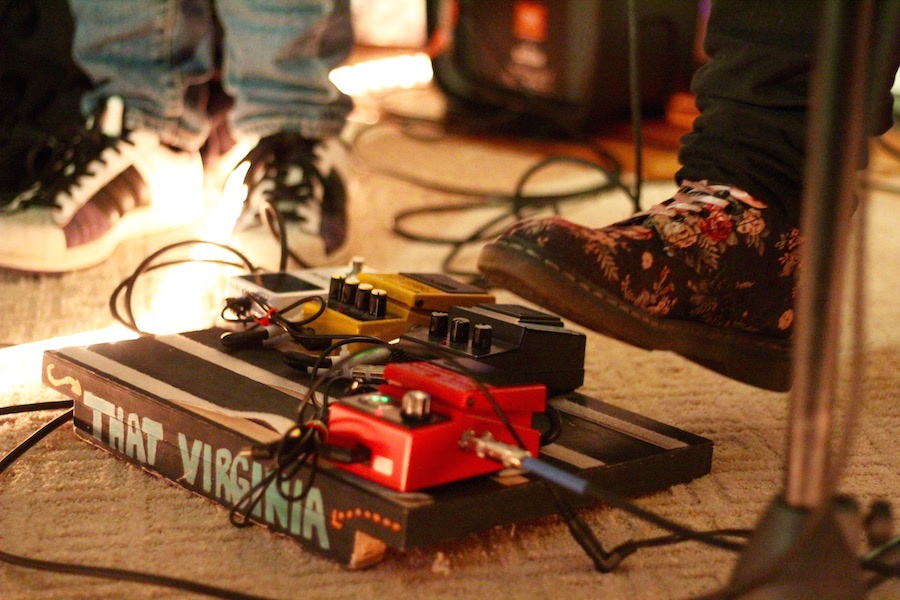
Around the room, faces flickered as she sang. Following Jessica Iris’ lead, she wowed with a series of loops, laying down gritty strings, hand claps, and clean staccato beats before transitioning to a cappella and then back to acoustic. Accompanied by her partner Maddie, she graced the group with sweet harmonies, her voice swelling to fill the space just as it seemed tame.
Her set, which included jokes on the bone-chillingly cold weather, left room for Merritt, who took the stage just past 9 p.m. Sliding into her set with a slap of her hand on the side of her guitar, Merritt dazed the audience with careful, delicate and fast finger picking, punctuated by hard, hollow-sounding percussion from the guitar. Not a sound like drumbeats, but water falling in caves, an echo hanging in the air as life continues around it.
In what she promised would be epically long tuning breaks—in fact, each was no more than two minutes—she kept the crowd on its toes with banter, relaying anecdotes about her cross-country sets (“This guy told me that he enjoyed watching me tune more than he enjoyed my set, and I was like …?”) and joking about the act of tuning itself. In her knowing fingers, the pegs glinted in the low light.
After the set, she said she had felt more comfortable at AcousticQ than she had in months.
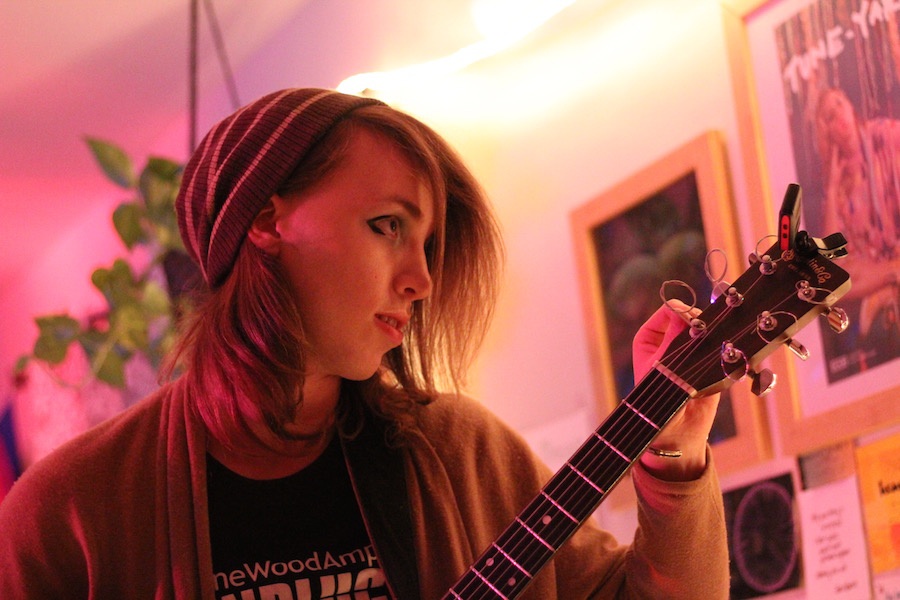
Dana Merritt: "I need places like this to express myself."
“I don’t play in bars,” she said, explaining that owners and audiences had misgendered her, touched her inappropriately, and make flippant comments about her gender. “Spaces like this are extremely important. I need places like this to express myself.”
“Writing music is the way that I process things,” she added. “I would be very, very mentally ill if I didn’t have music.”